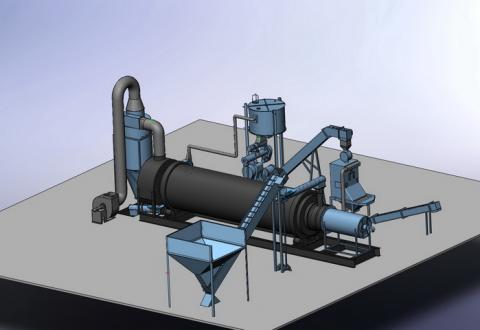(productivity: 1,0 ton per hour)
To present days vitamin-grass flour was produced using plants of the analog machine model which as known, were expensive, metal consuming aggregates with the high power-consuming of the process. It predetermined the complete failure of the model.
The radical improvement of performance characteristics of the production of flour from vegetable raw materials and field husbandry wastes is possible only through a new technical approach based on a new technical base. This base is developed by us unique energy-efficient hardware for the fragmentation, crushing, dispersion, spraying, separation and iltration, which serve as the basis for the creation of highly effective высокоэффективного compact modular unit for the production of flour, briquettes, granules and protein concentrate from initial vegetable raw materials with the productivity of 1,0 ton per hour with predictable power intensity - not more than 65 kilowatt-hour per ton. Major advantages of the suggested solutions are the simplicity and high effectivity of the developed hardware for the processing of viscous materials. It allows to bring about the new resource-economy technology for the processing of vegetable raw materials.
Attempts to create a new effective plant for the production of flour from vegetable raw materials were made more than once earlier, however the low efficiency factor of thehardware for the processing predetermined also the low efficiency of the technological process in general.
The hardware for processing developed in out Institute allows to reject the traditional energy-consuming process flowsheet, and to process initial raw materials without a preliminary cutting into paste, by means of spraying which, after the juice elimination, to get vegetable flour or to form briquettes of given configurationfor the following drying in natural conditions, with the following fragmentation-crushing. According to the known, existing earlier technology the preliminary crushed raw materials is being dryed in a cylinder drier, and then is crushed in hammer grinders, with power intensity of the process - 150 kilowatt-hour per ton and discharge intensity - 300 kilogram per ton. According to the suggested technology these 3 power-consuming manufacturing methods and the achines for it implementation are combined in one aggregate and are produced in a reverse sequence: from initial raw materials which do not require the preliminary cutting, a paste is produced. Using the centrifugal separation a liquid phase is separated from the paste, and the obtained hard phase (cellulose) is delivered for the briquetting; the lkiquid phase through a centrifugal coagulator-thickener and filterin centrifuge machine is deliverd in the vortical dryer where it is transformed in a protein-vitamin powder concentrate, with the total power intensity - 85 kilowatt-hour per ton, not using the fuel material.
Nowadays there are developed plants, examination of which acknowledged thier high predictable efectiveness:
- rotary sieve mill for the production of pastes from vegetable raw materials and field husbandry wastes, productivity - 0,5 ton per hour, power intensity - 9 kilowatt-hour per ton;
- rotary mill-defibrator for the processing of viscous and fibrous materials straw including, getting a fine-fibre product as the end product, productivity - 0,5 ton per hour, power intensity - 12 kilowatt-hour per ton;
- plunger crusher-mill-pasteproducer, productivity - 0,5 ton per hour, powe intensity - 10 – 18 kilowatt-hour per ton depending on the quality of the initial material and the end product;
- spraying-dispersing machines for viscous slurred materials, productivity - up to 0,5 ton per hour, power intensity - 5 – 10 kilowatt-hour per ton; the fundamental quality of the machine is the weak dependance of its working on the alteration of initial viscosity and fractinal composition;
- granulator-briquetter of the isostatic pressing, productivity - 0,5 ton per hour, power intensity - 18 kilowatt-hour per ton.
By its characteristics th given set of machines is unique in Russia asn abroad. It can be a general base for the production of vitamin-grass flour, briquettes, granules and protein concentrate from initial vegetable raw materials of a wide range.
The economy, simplicity and compactness of engineering solutions make for the technical and economical effectiveness of the given complex. These factors in their turn determine the high competitive ability on the world market. Moreover the high specific capacity of the plant will allow to satisfy the requirements of Russia in the given component of the mixed feed, and also to produce flour for export.

